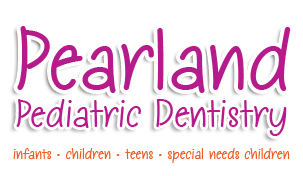Stress Free Sedation Dental Care
in Pearland Texas
in Pearland Texas
Children can benefit from sedation dentistry if they have one or more of the following:
- Young age
- First time for dental treatment
- Fear/anxiety of the dentist and dental treatment
- Need for extensive dental treatment
- Past traumatic dental experience
- Fear of being numbed
- Trouble getting numb
- Sensitive teeth
The two most common types of sedation dentistry are:
- Inhalation sedation
- Oral mild/moderate sedation
If a child has treatment with sedation, in order to make sure he or she is comfortable, local anesthesia is used. This means that the patient will be numbed inside of the mouth even if he or she is sedated.
We understand the thought of injections can be scary to our patients, so Dr. Clark or Dr. Zoronjic will administer your child’s oral medication. The Compudent is a computerized machine that distributes the local anesthesia at a slow rate, which decreases the discomfort for the patient.
Some boys and girls become highly apprehensive even at the sight of needles or a syringe. The Wand, which is the actual handpiece, has a very non-threatening appearance and does not look like a traditional syringe.
Inhalation Sedation
Some children are given nitrous oxide/oxygen, or what you may know as “laughing gas,” to relax them for their dental treatment. Nitrous oxide/oxygen is a blend of two gases: oxygen and nitrous oxide.
Nitrous oxide/oxygen is given through a small breathing mask which is placed over the child’s nose, allowing her or him to relax, but without putting the patient to sleep. The American Academy of Pediatric Dentistry, recognizes this technique as a very safe, effective way to treat children’s dental needs.
The gas is mild and easily taken. With normal breathing, it is quickly eliminated from the body. It is non-addictive. While inhaling nitrous oxide/oxygen, your child remains fully conscious and keeps all natural reflexes. Your son or daughter will also have injections (sleepy juice) to numb the teeth for treatment.
Prior to your child’s appointment with nitrous oxide
Please inform us of any change to your youngster’s health and/or medical condition.
Tell us about any respiratory condition that makes breathing through the nose difficult for your little one; it may limit the effectiveness of the nitrous oxide/oxygen.
Let us know if your child is taking any medication on the day of the appointment. If he or she uses an inhaler for asthma (either daily or as needed) please bring it to the dental appointment. Our office is equipped with an up-to-date emergency drug kit that has an inhaler, but some children do better with one they are familiar with if it is needed.
Please do not allow your youngster to eat or drink two hours prior to the appointment, because the nitrous oxide/oxygen may upset his or her stomach and result in vomiting.
Oral Conscious Sedation
Oral conscious sedation is mild sedation taken orally, and recommended for apprehensive children and very young children, as well as some children with special needs. It is used to calm your child and to reduce the anxiety or discomfort associated with dental treatments.
Your son or daughter’s pre-operative vital signs are taken before the sedation medication is given. The oral liquid sedation medication is administered in the office by Dr. Clark or Dr. Zoronjic. A pulse oximeter and blood pressure monitor is kept on the patient throughout the dental treatment, along with a pre-trachial stethascope.
The effect of the sedation is to produce a profound relaxation to facilitate a more pleasant dental experience. Your child may be drowsy, and may even fall asleep (similar to taking a nap), but will not become unconscious. He or she will keep all natural reflexes.
Even with conscious sedation, your child may still fuss during treatment. It is difficult to predict accurately how a child may react to this light sedation. Nitrous oxide/oxygen is normally used in conjunction with oral mild sedation.
Even though your little one may be sedated, he or she will still receive anesthetic injections (sleepy juice) to numb the teeth for various procedures, including extractions, crowns, and/or pulpotomies. If your child’s treatment is limited to fillings alone, the patient may benefit from use of the hard-tissue laser, which would not require an injection to numb the treatment area.
It is important for your child’s safety that you follow these instructions carefully. Failure to follow these instructions could result in serious injury.
Pre-operative Conscious Sedation Instructions
- Do not give your child ANY medications before the appointment which may combine with the sedative without checking with one of the doctors first.
- If the child is on a regular medication, please inform the office when we confirm your appointment.
- No food or liquids after midnight for all children. Your child must be NPO/fasting the morning of their appointment. Please do not have your child brush their teeth the morning of the appointment to prevent them from swallowing any water. It is recommended to remove any drink containers from their rooms the night before their sedation and to make sure there is no food in the car the morning of their sedation appointment.
-
Please dress your child in light, loose, comfortable clothing (preferably not white) for the appointment. If your child is recently toilet trained, dress him/her in a diaper (or Pull-Up) in case of an accident.
-
If prior to your appointment your child becomes ill (ie. Fever, upper respiratory infection, etc), please contact our office to possibly reschedule your appointment. Your child must be healthy for 4 weeks before their sedation appointment.
-
If your child has a favorite stuffed animal, blanket, or toy, they are welcome to bring it to the appointment. They are also welcome to bring a movie on DVD.
-
A parent of guardian must bring your child to the office and must be present in the reception room for the entire appointment. For your child’s safety, we may need to watch him/her for several minutes following the treatment to make sure he/she is alert and stable before dismissal from the office. It is recommended that you have a friend or family member accompany you to the office to assist you and your child following the completion of the appointment.
-
A parent or guardian must be home with your child for the remainder of the day. Do not plan activities for your child because they will feel the effects of the medication for 6 to 8 hours following the appointment. Your child should not go to school or daycare for the remainder of the day.
-
Please plan ahead and have soft food and lots of liquid for your child following the appointment.
Post-Operative Oral Mild / Moderate Sedation Instructions
- Your child needs to be watched for several hours (6+) following the sedation appointment. It is important that you keep your child awake in the car on the way home (and have them properly restrained.
- Do not give your child grapefruits or grapefruit juice for 24 hours due to a chance of re-sedation
- The effects of the medication may continue after discharge from the office and your child may be drowsy. Please be aware that your child may be fussy and disoriented following the treatment and must be watched to avoid injury.
- If he/she would like to sleep after they get home, please place them on their side. Do not allow your child to participate in activities where physical coordination or skill is involved since his/her reactions may be slowed. Basically, no outside play following the treatment.
- After the dental appointment, offer your child liquids, starting with a small amount of water. Once they are able to keep water down, then you may give them other clear liquids (i.e. apple juice, white grape juice). It is important after the dental visit that your child be hydrated. Please make sure your child does not bite their tongue, lip, or cheek due to being numb.
- Once the numbness wears off, then you may offer your child soft foods.
- Occasionally a child can have postoperative complications such as nausea, dizziness, and vomiting. If prolonged vomiting occurs, please contact our office.
- It is recommended for your child to be given an over the counter anti-inflammatory following the appointment. Since your child has an empty stomach, Tylenol is better to give at first. Please follow the directions according to the manufacturer.
- If your child seems to be having problems, please contact our office at 713-436-4080.





